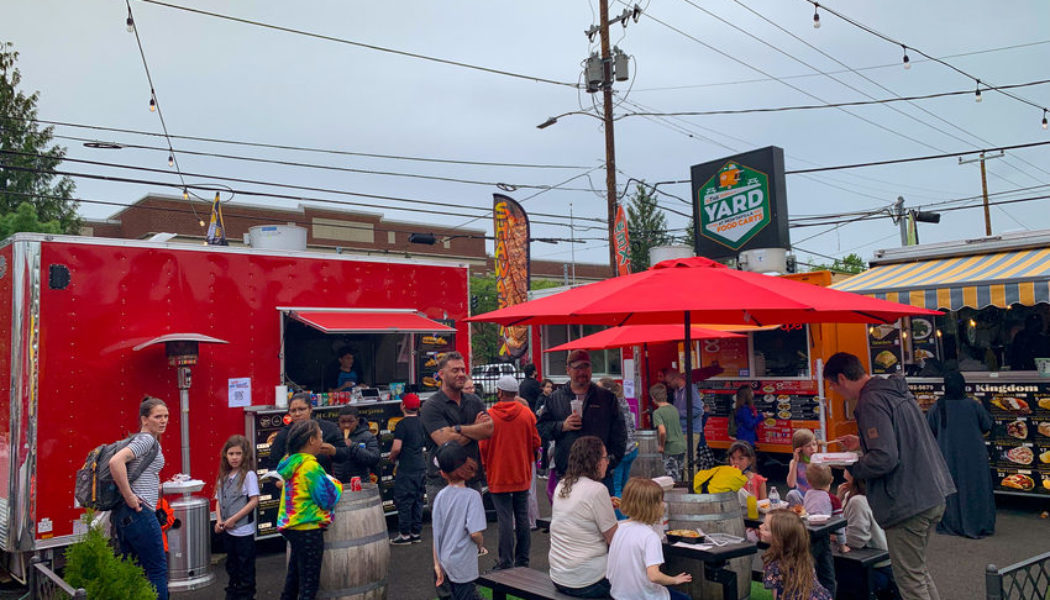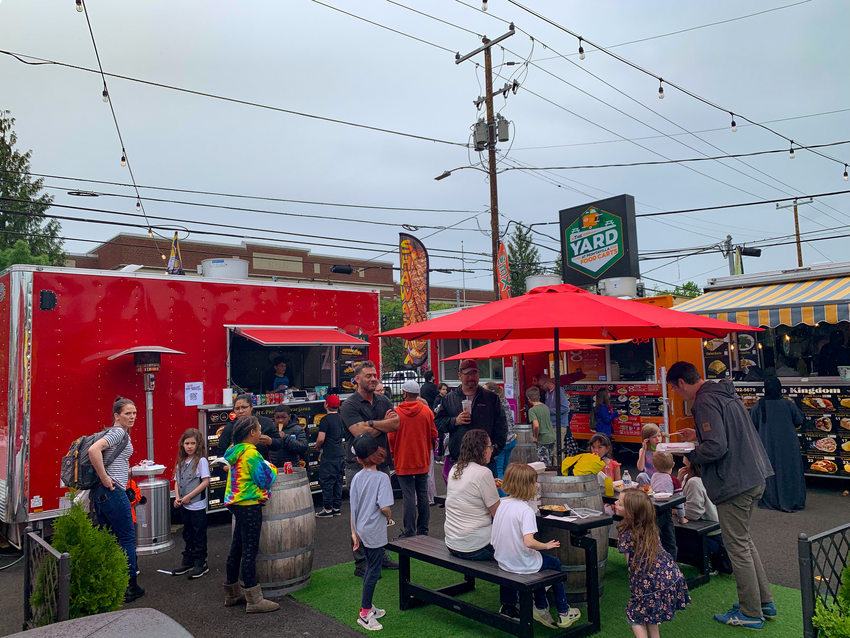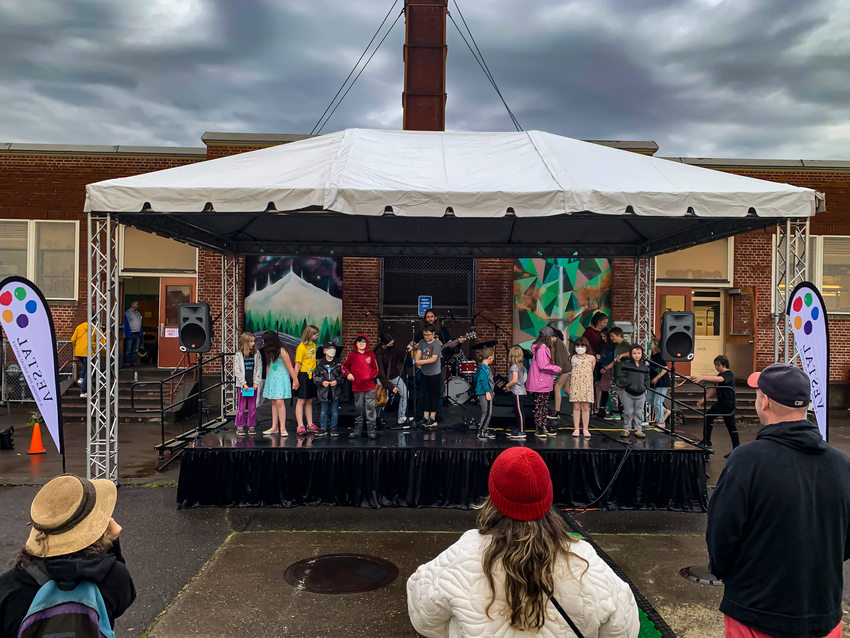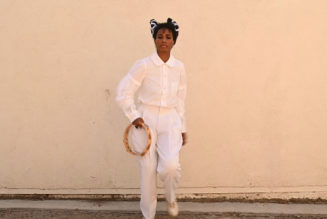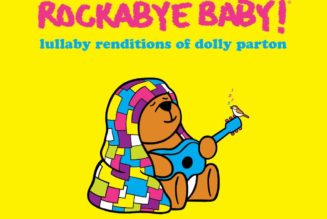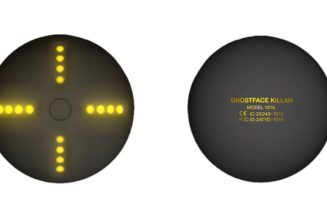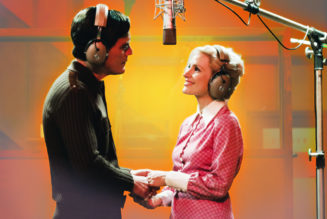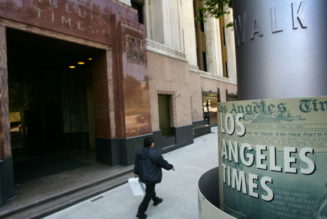In May 2022, Vestal Elementary School on Southeast 82nd Avenue in Portland held its annual Social Justice Night. Vestal students and their families along with neighborhood residents gathered first at The Yard food cart pod across the busy street. Cart owners, mostly immigrants and refugees, made dinner for attendees.
Then people filed across the street to the school to check out students’ social justice projects – many of them made in collaboration with Portland State University students – and enjoy a special jazz performance composed by local musicians, using stories from three immigrant food cart owners.
Darrell Grant, renowned jazz musician and professor of Jazz Studies at PSU, said what made the event such a success was all the people that came together – the grade schoolers, the food cart owners, the jazz musicians and the college students.
“We’re all connected through place, and we can all come together in place,” Grant said. It’s a repository for all the different gifts that we give.”
The group behind the celebration was awarded a Community Placemaking grant from Metro. Community Placemaking grants are offered yearly and support community-led, equity-focused, arts and culture based efforts that strengthen people’s connection to each other and places they care about.
Vestal is a school for social justice. One second grader provided a straightforward definition of social justice: “Social means our whole community and justice means we help anybody who needs it.”
Another student said, “Focusing on social justice means you pay attention to your community and take action when people need help and support.”
Each year, every grade at Vestal applies a social justice lens to a different community issue, ranging from food insecurity to lack of access to showers and laundry facilities. These explorations, done in tandem with a variety of community partners, become the projects displayed at Social Justice Night.
Meanwhile on the other side of the Willamette, college students taking part in Portland State University’s Artist as Citizen Initiative look at the same issues the kids at Vestal are tackling.
“Artist as Citizen is about marrying the arts to social justice,” Grant said. Grant co-founded the program with fellow PSU faculty member Suzanne Savaria. The initiative’s capstone class encourages hands-on participation in local activism. For the last four years, Artist as Citizen capstone students have supported Vestal’s Social Justice Night by teaming up with Vestal students on yearlong social justice projects.
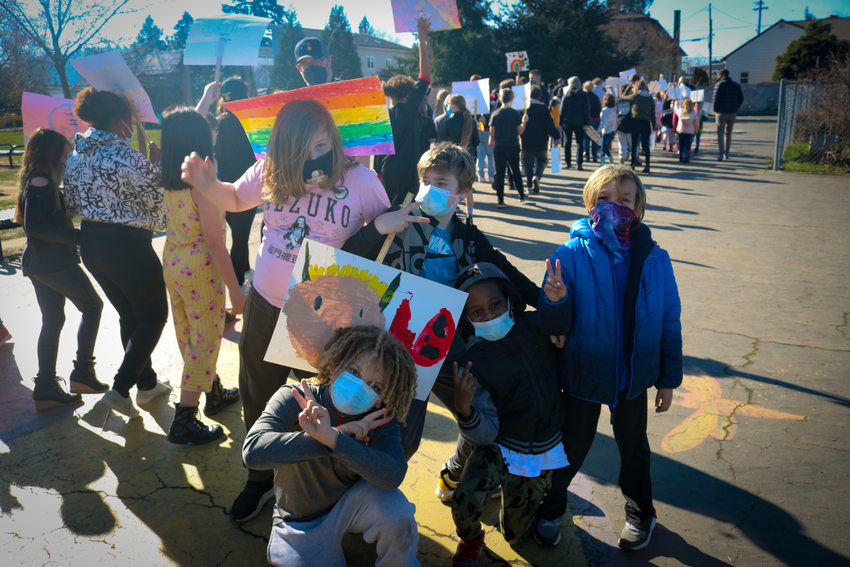
“Fifth graders have a wonderful ability to think big but be really young,” said Savaria. “If you can wrangle that spirit, you can really create some amazing things.”
Grant agreed. “I think that our PSU students learn an immense amount by being on the ground with this school that serves marginalized populations, that’s focused on social justice – they learn a lot about the issues impacting community, and their own agency.” The experience is world-expanding for both sets of students.
“The kids at Vestal see that somebody outside of their world cares about them, finds them interesting, is willing to listen to their stories and come visit them – I mean, it’s incredible to see,” Grant said. “We’re introducing them to the idea that there’s this college, it’s called PSU, and they have a connection to it.”
At the school, Savaria and Grant brushed shoulders with Neil Mattson, executive director of Montavilla Jazz, a local nonprofit that funds residencies for local jazz musicians at Vestal. The potential for collaboration was clear. It was Mattson’s idea to combine forces for 2022’s Social Justice Night.
With the support and collaboration of Vestal’s principal, Sabrina Flamoe, Savaria, Grant and Mattson applied for and received a $24,890 Community Placemaking grant from Metro.
Using grant funds, Montavilla Jazz brought on three local artists, Denzel Mendoza, Machado Mijinga and Mary-Sue Tobin, to create original compositions for the event. The pieces were informed by, and occasionally included snippets of, conversations between the musicians and three immigrant food cart owners at The Yard food cart pod. The cart owners invovled included Nancy Manchusa, Samira Mohamed and Ricky Lopez owners of Bai Yok Thai, Mira’s East African Cuisine and Ricky’s Sushi, respectively. Mattson gave cart owners grant funds to make dinner for the event attendees. This relationship building was pivotal.
“The process was really interesting because that’s how each food cart owner became more connected to the school,” Mattson said. “And the school, with all the families, came to the food carts. Hopefully it can be business growth for the carts.”
The podcast
Vestal Storytelling Project
Stream it free on SoundCloud.
PSU students worked with Vestal students to make a podcast with help from Erica Thomas of Works Progress Agency – about these collaborations.
Composer and trombone player Denzel Mendoza worked with Thai food cart owner Nancy Manchusa, whose restaurant burnt to the ground years prior. Mendoza felt he and Manchusa had so much in common as immigrants and as cooks.
“She’s incredibly giving and understanding,” Mendoza said. Every single moment talking to Nancy reminded me of my mother. It was uncanny. What I gained from Nancy’s stories was her dedication, her love and her commitment to what she’s offering to the community.”
Manchusa’s parents would wake up to cook at 3 or 4 a.m. That’s how she learned to cook.
“People ask me why the food is good and I say, it’s because I put my love in there.”
Speaking about the original music he created, Mendoza said, “This is a true story of people’s lives, both Nancy’s and mine. So, what I hope to see is…the understanding of self-expression, the understanding of what these stories mean. Because most folks don’t know an undocumented immigrant. Most people don’t know what it’s like or will ever know what it’s like. My chance as a musician to showcase these stories and these efforts, that’s what I want the audience to understand. I’m not performing, I’m not entertaining. I’m telling a story.”
Listen to Denzel Mendoza’s “A Mother’s Hunger”
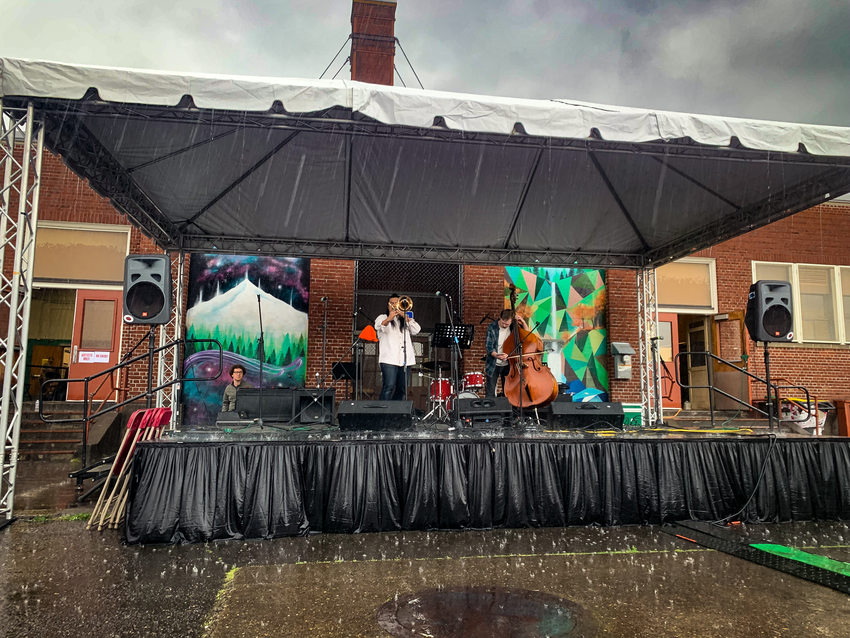
Ricky Lopez is the sole supporter of his household. His family, immigrants from Guatemala, started making sushi in restaurants in 1994.
“I have to be here 7 days a week,” Lopez said.
Composer, musician Machado Mijiga says Lopez makes really good sushi. When describing the collaboration for social justice night Mijiga said, “Maybe this starts as a blueprint for the future.”
Listen to Machado Mijiga’s “The Serpent”
Vestal Elementary was the first school that cart owner Samira Mohamed attended after her family immigrated from Somalia.
“I love Vestal,” Mohomad said. She also reflected on how different the school’s setting was when she was a young student new to this country.
“Right now I see they have a lot of programs to help with English. They have extra teachers. They pull out the kids to teach them reading-wise to catch up and still be in the main classrooms so they don’t have to feel like they’re isolated as well,” Mohamed said. “But back then, it felt like, if you were new, you were in a separate side of the community and you didn’t see the main classroom or anyone, so I didn’t get to see that when I was younger.”
Mary Sue Tobin is a musician, teacher, educator and a PSU alumni. Focusing on Mohamed’s story, she said, “There’s a lot of poetry in east African music, very spoken word heavy.” She looped Mohamed’s words into one of the pieces. “We use music to convey our culture. We use music to convey our culture.”
Listen to music composed by Sue Tobin
When Mohamed was approached by Mattson about this proposal, she thought, “It would make a difference, building that community between the foodcarts and the school. Every small business that you support here, it comes back to the community.”
Grant understands how important opportunities like this are. “What we’re trying to do is create functional ecosystems,” he said. “And those ecosystems have to be inter-generational, they have to bring together different perspectives so that everyone benefits.”
“To me, placemaking is such an effective lens through which to channel the work that we all do,” Grant said and smiled before adding, “and it makes the place better, and cooler, more fun! It gives people a sense of belonging.”
